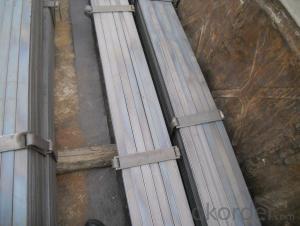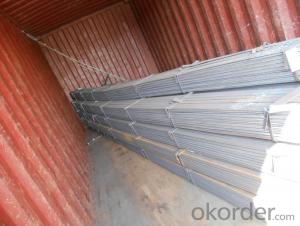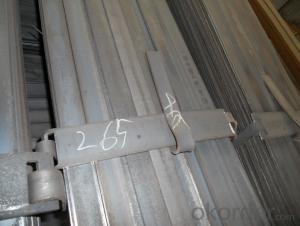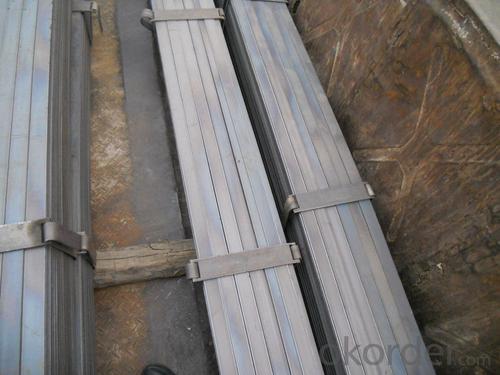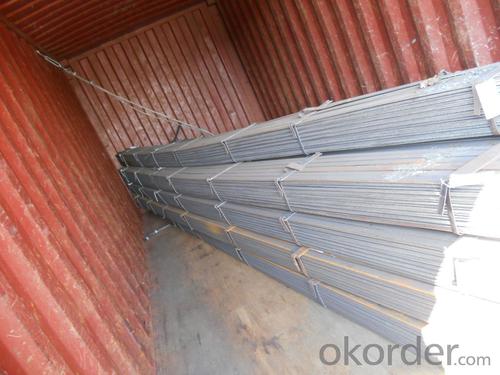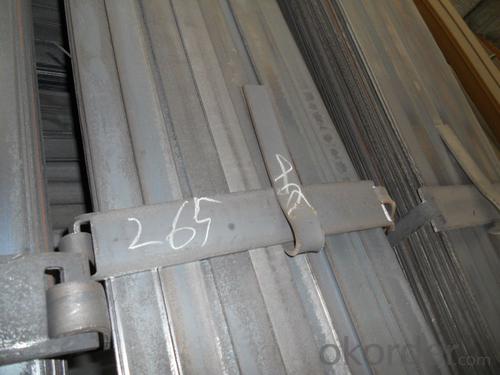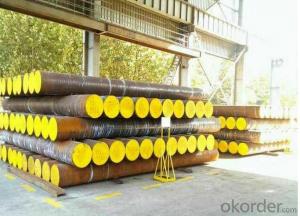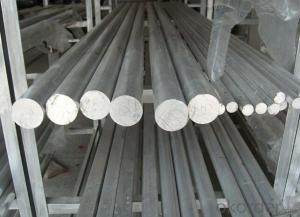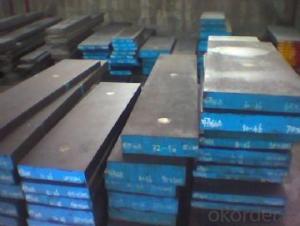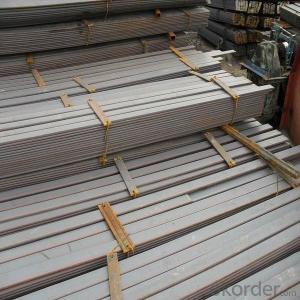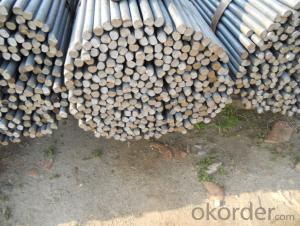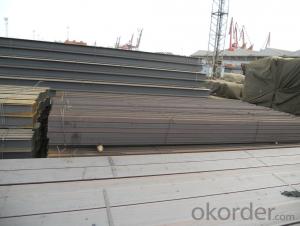Chinese Prime Hot rolled Spring Steel Bar/billet/products JIS standard/Europe standard/ ASTM standar
- Loading Port:
- Shanghai
- Payment Terms:
- TT OR LC
- Min Order Qty:
- 100 m.t.
- Supply Capability:
- 1200 m.t./month
OKorder Service Pledge
OKorder Financial Service
You Might Also Like
Specifications
Spring steel flat bar
Garde: 60Si2Mn, 60Si2MnA, 55CrMnA,50CrVA
Standard GB,JIS,ASTM,DIN,AISI,BS
LF & VD forge;ISO&TUV appr
Materials
Q195,Q215,Q235B,Q345B,
S235JR/S235/S355JR/S355
SS440/SM400A/SM400B
Product Category
Metallurgy,Mineral &Energy
Technique
HOT ROLLED
Packing
1.Big OD:in bulk
2.Small OD:packed by steel strips
3.woven cloth with 7 slats
4.according to the requirements of customers
Usage
Mechanical&manufacture,Steel strcuture,
Shipbuilding,Bridging,Automobile chassis
Main market
Middle East,Africa, Asia and some Uropean country and America ,
Australia
Country of origin
China
Productivity
15000 Metric Tons pet Month
Remark
Payment terms :T/T ,L/C
Terms of trade :FOB ,CFR,CIF ,DDP,EXW
Minimum order : 10 tons
Lead time :on or before 3-15 working days .
- Q: What are the different quality control measures for special steel production?
- Some of the different quality control measures for special steel production include strict material sourcing and selection, thorough testing and inspection during the manufacturing process, adherence to specific industry standards and specifications, regular calibration and maintenance of equipment, proper handling and storage of finished products, and continuous monitoring and improvement of overall production processes.
- Q: What are the different surface finishing techniques used for special steel?
- Some of the different surface finishing techniques used for special steel include electroplating, powder coating, galvanizing, passivation, and mirror polishing.
- Q: What are the factors that affect the wear resistance of special steel?
- The factors that affect the wear resistance of special steel include the composition of the steel, the hardness of the steel, the presence of carbides or other strengthening elements, the microstructure of the steel, the presence of surface treatments or coatings, the contact load or pressure applied to the steel, the sliding speed or velocity of the contact, the temperature at which the steel is operating, and the presence of any abrasive or corrosive media.
- Q: How does special steel contribute to the pharmaceutical industry?
- Special steel contributes to the pharmaceutical industry by providing the necessary materials for the production of high-quality equipment and tools. It is used in the manufacturing of pharmaceutical machinery, such as reactors, mixers, and pumps, that require corrosion resistance and hygienic properties. Special steel also plays a crucial role in the construction of storage and transportation containers for pharmaceutical products, ensuring their safety and efficacy.
- Q: How does special steel perform in high-temperature applications?
- Special steel performs exceptionally well in high-temperature applications due to its unique composition and properties. It exhibits excellent heat resistance, maintaining its strength and hardness even at elevated temperatures. Special steel also demonstrates exceptional thermal stability, preventing deformation and maintaining dimensional stability under extreme heat. Additionally, it possesses excellent oxidation and corrosion resistance, ensuring longevity and durability in high-temperature environments. Overall, special steel is specifically designed to withstand and excel in demanding high-temperature applications.
- Q: How does special steel contribute to reducing greenhouse gas emissions?
- Special steel contributes to reducing greenhouse gas emissions in several ways. Firstly, it is used in the production of energy-efficient vehicles, such as electric cars, which have lower emissions compared to conventional vehicles. Additionally, special steel is employed in the construction of wind turbines, which generate clean and renewable energy, reducing the reliance on fossil fuels. Furthermore, special steel is utilized in the manufacturing of energy-efficient appliances and buildings, which consume less energy and subsequently emit fewer greenhouse gases. Overall, the use of special steel in various sectors promotes sustainable practices and helps mitigate the impact of greenhouse gas emissions on the environment.
- Q: Can special steel be used in the semiconductor manufacturing industry?
- Yes, special steel can be used in the semiconductor manufacturing industry. Special steel alloys, such as stainless steel and tool steel, are often used in the construction of semiconductor equipment and components. These steels are chosen for their high strength, corrosion resistance, and thermal stability, which are essential properties for withstanding the harsh environments and processes involved in semiconductor manufacturing. Additionally, special steel can be engineered to have low levels of contamination, making it suitable for applications where purity is crucial, such as in cleanroom environments.
- Q: How does special steel contribute to the infrastructure development?
- Special steel contributes to infrastructure development in several ways. Firstly, special steel possesses high strength and durability properties, making it an ideal material for constructing bridges, buildings, and various infrastructure projects. Its strength allows for the creation of lighter and more efficient structures, reducing construction costs and increasing project lifespan. Additionally, special steel is corrosion-resistant, ensuring the longevity and reliability of infrastructure in harsh environments. Moreover, special steel is used in the production of construction equipment and machinery, enabling efficient and effective construction processes. Overall, special steel plays a crucial role in enhancing the safety, resilience, and sustainability of infrastructure development.
- Q: What are the main factors affecting the fatigue strength of special steel?
- The fatigue strength of special steel is influenced by several main factors: 1. Material composition: The chemical composition of special steel plays a significant role in determining its fatigue strength. Alloying elements such as carbon, chromium, molybdenum, and nickel can enhance the material's resistance to fatigue by improving its ability to withstand cyclic loading. 2. Microstructure: The microstructure of special steel, including the grain size, crystallographic texture, and presence of any precipitates or phases, can significantly affect its fatigue strength. Fine-grained structures generally exhibit higher fatigue strength due to reduced stress concentrations and improved resistance to crack initiation and propagation. 3. Surface condition: The surface finish and integrity of special steel can have a significant impact on its fatigue strength. Surface defects, such as scratches, notches, or roughness, can act as stress concentrators and initiate fatigue cracks. Proper surface treatments, such as grinding or shot peening, can improve the fatigue resistance by reducing stress concentrations and introducing compressive residual stresses. 4. Heat treatment: The heat treatment process used to modify the structure and properties of special steel can also affect its fatigue strength. Proper heat treatment techniques, such as quenching and tempering, can optimize the material's microstructure, improve its hardness, and enhance its resistance to fatigue. 5. Loading conditions: The type and magnitude of cyclic loading applied to special steel significantly influence its fatigue strength. Factors such as stress amplitude, mean stress, load ratio (ratio of minimum to maximum stress), and frequency of loading can all impact the fatigue life of the material. 6. Environmental conditions: The presence of corrosive environments, high temperatures, or other harsh conditions can decrease the fatigue strength of special steel. Environmental factors can accelerate crack initiation and propagation, leading to reduced fatigue life. Proper selection of corrosion-resistant alloys or protective coatings can mitigate the adverse effects of the environment on fatigue strength. By considering and optimizing these factors, manufacturers and engineers can enhance the fatigue strength of special steel, ensuring its reliability and longevity in various applications.
- Q: What are the different aerospace grades of special steel?
- There are several aerospace grades of special steel that are commonly used in the aerospace industry. These grades are specifically designed to meet the high-performance requirements and stringent safety standards of aerospace applications. Some of the different aerospace grades of special steel are: 1. 300M: This grade of steel is known for its exceptional strength and toughness. It is commonly used in aircraft landing gears, structural components, and other high-stress applications. 2. 4340: 4340 steel is a widely used alloy steel in aerospace applications. It has high strength and good hardenability, making it suitable for gears, shafts, and other critical components. 3. 17-4 PH: This stainless steel grade offers a combination of high strength, corrosion resistance, and good toughness. It is commonly used in aerospace applications such as aircraft engine components, landing gears, and structural parts. 4. 15-5 PH: Similar to 17-4 PH, 15-5 PH stainless steel also offers high strength and corrosion resistance. It is often used in aerospace applications where weight reduction is crucial, such as aircraft structural components. 5. 300 series stainless steels: Grades like 301, 302, and 304 are commonly used in aerospace applications due to their excellent corrosion resistance, low magnetic permeability, and good strength-to-weight ratio. These steels are used in aircraft structures, fuel tanks, and other components exposed to harsh environments. 6. Titanium alloys: While not technically steel, titanium alloys are widely used in aerospace applications due to their exceptional strength, low density, and high corrosion resistance. Grades like Ti-6Al-4V are commonly used in aircraft structures, engine components, and landing gears. These are just a few examples of the different aerospace grades of special steel used in the industry. Each grade offers specific properties and characteristics that make them suitable for various applications in the aerospace field.
Send your message to us
Chinese Prime Hot rolled Spring Steel Bar/billet/products JIS standard/Europe standard/ ASTM standar
- Loading Port:
- Shanghai
- Payment Terms:
- TT OR LC
- Min Order Qty:
- 100 m.t.
- Supply Capability:
- 1200 m.t./month
OKorder Service Pledge
OKorder Financial Service
Similar products
Hot products
Hot Searches
Related keywords
